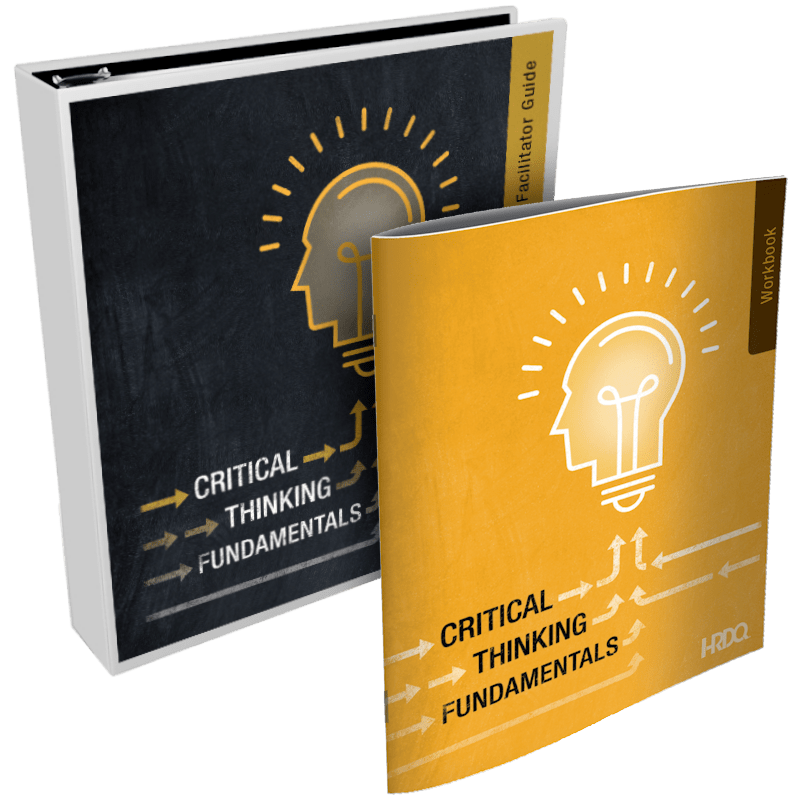Share
The Best Ways to Improve Your Critical Thinking Skills
Bradford R. GlaserAll employees in a workplace should have excellent critical thinking skills. The challenges of every workday require staff who can tackle issues with a clear and level head. The better the critical thinking skills, the more likely the individual is to have success in their career. But developing these skills can be difficult. Fortunately, there are a few easy ways to improve them.

- Understand what critical thinking is
- Recognize critical thinking mistakes
- Gain a four-step critical thinking process
Table of Contents
Why Is It Important?
Critical thinking skills are highly desired by employers. Numerous studies reflect the importance of critical thinking in the workplace:
- An analysis by Indeed.com found that references to critical thinking have doubled in job listings on their site since 2009.
- A survey of business and nonprofit leaders sponsored by the Association of American Colleges and Universities (AAC&U) found that 93% of respondents believe the ability to think critically is more important than a potential employee’s undergraduate major.
- A study by UMass said critical thinking more strongly predicted life events than intelligence and significantly added to the variance explained by IQ.
With all of these reports, the demand for critical thinking skills in the workplace is undeniable. Employers across various industries recognize that analytical skills, better decision-making, and improved problem-solving abilities are crucial for success. As the job market continues to evolve, developing these skills will not only enhance individual prospects but also contribute to organizational growth and innovation. Investing in the development of critical thinking abilities is a strategic decision that can set individuals and organizations ahead of the rest.
The Traits of Critical Thinkers
All effective critical thinkers have a few specific traits that help guide them in everyday life. These characteristics allow the person to successfully navigate any workplace situation. They include:
- Inquisitiveness
- Open-mindedness
- Objectiveness
- Analytical
- Reflectiveness
- Reasonability
An in-depth literature review of critical thinking, published by Pearson, found commonalities in general frameworks for examining critical thinking, as well as particular characteristics and skills. They found that the most commonly cited characteristics in critical thinking literature included "open- and fair-mindedness, inquisitiveness, flexibility, a propensity to seek reason, a desire to be well-informed, and a respect for and willingness to entertain diverse viewpoints.”
There are also three fundamental skills for engaging in effective critical thinking: the ability to reason, the ability to predict consequences, and the ability to evaluate the merit of potential conclusions or solutions. Using these three fundamentals will allow you to become a better critical thinker.
Steps to Perform Better Critical Thinking
- Think open-mindedly. Make sure you approach the issue or problem with an open mind. If you go into the situation with preconceived biases, you are less likely to arrive at the best conclusion. To do this, thoughtfully consider different perspectives, listen to others without immediate judgment, and be open to changing your opinion based on the information you’ve learned.
- Raise vital questions and problems. Don’t take information at face value – question assumptions. Make sure you ask plenty of clear questions, such as “What evidence supports this claim?” and “Are there alternative explanations?” so you acquire as much knowledge as possible about the issue. This will give you the most information to make informed decisions.
- Gather and assess relevant information. Continue your research and gather as much information as possible – seek different perspectives in this endeavor. Asses it all with your already open mind.
- Come to well-reasoned conclusions and solutions. Once you have all the information possible, you will likely assess and come to a well-reasoned conclusion. You can then offer solutions based on the conclusion.
- Figure out solutions to complex problems. This more narrow step is going further into figuring out more in-depth solutions needed for more complex issues. Repeat steps one through four again if needed.
- Engage in continuous learning. Lifelong learning is key to improving critical thinking skills. Take courses on various subjects, read more books, attend different lectures, etc. When you continue to learn, it opens you up to new points of view and keeps your mind active as you are continually gaining new perspectives and ways of analyzing the world around you.
Benefits of Critical Thinking
Critical thinking has many benefits. It can allow you to communicate more effectively with your manager and team members, better develop new policies and procedures, and improve the value of written reports. People with good critical thinking skills are able to decide whom to hire or promote, choose new markets, improve customer service strategies, and handle a crisis. Further, they can better predict the consequences of new actions or events.
Good critical thinking skills will help employees succeed in their jobs and move forward in their careers. Thinking through challenging situations is essential in order to be able to grow. Knowing how to apply the right thinking around a task will give you the ability to go far.

Keep the Learning Going
Critical Thinking Fundamentals is a research-based tool that will help participants arrive at more stable, effective solutions and decisions through observing how to build the skills that are the foundation of the critical thinking process and learning how to apply a consistent thought process to any situation that requires a resolution or action.
Critical Thinking Fundamentals has been designed to help participants arrive at more stable, effective solutions and decisions – first, by learning how to build the skills that are foundational to the critical thinking process, including the ability to reason, predict consequences, and evaluate the merit of potential conclusions, and second, by learning how to apply a consistent thought process to any situation that requires a resolution or action. Effective critical thinking requires the ability to seek a broad perspective on the issue as well as the ability to narrow an issue down to make a proper decision. It is from this perspective that we have developed a model for critical thinking, which serves as the framework for the program.






















































1 comment
Great Article on Creativity Thinking. Thanks for great info.